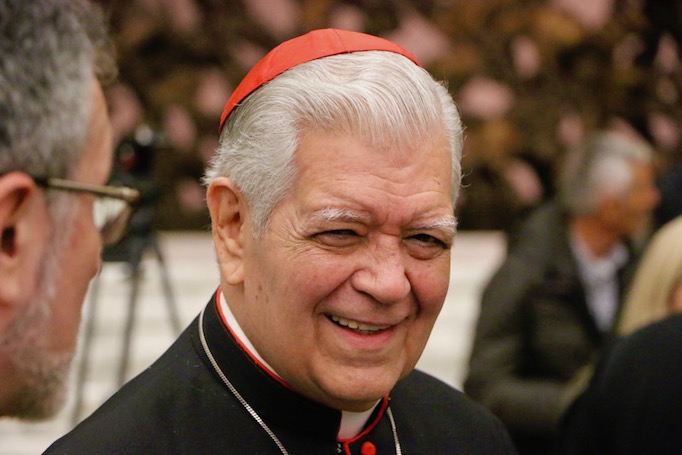Venezuelan Bishops Meet Pope Francis in Bid to End Unrest in Country
The meeting comes after Vatican-brokered peace talks broke down and amid increasing protests.

At their own request, Venezuelan bishops have been meeting Pope Francis today in an effort to find a solution to the anti-government unrest that continues across the Latin American country.
Six bishops, including conference president Archbishop Diego Padrón Sánchez of Cumaná, Cardinal Jorge Urosa Savino of Caracas, and Cardinal Baltazar Porras Cardozo of Mérida have been meeting the Holy Father in order to speak “about the situation in Venezuela,” according to a Vatican statement released on Monday.
The meeting comes just months after Vatican-brokered peace talks between Socialist leader Nicolas Maduro and opposition leaders broke down.
Protests have spread across Venezuela since early April, as food and medicine shortages have affected millions, according to Reuters. At least 65 people have died in the unrest, with hundreds more injured.
The current unrest, which dates back to 2014, grew out of the country's high levels of urban violence, inflation, and chronic shortages of basic goods attributed to the government's leftist economic policies such as strict price controls.
On his way back from Egypt at the end of April, the Pope said talks broke down because the proposals either weren’t accepted or were “diluted” as the government was unable to give a clear answer. “It was a ‘yes-yes,’ but ‘no-no,’” he said.
“We all know the difficult situation of Venezuela,” he said. “It is a nation that I really love,” but added that any re-launching of the talks “has to be with conditions already, very clear conditions.” He acknowledged that part of the opposition “doesn’t want this.”
“The very opposition is divided, and on the other hand, it appears that the conflicts are always worse,” he said, but added hopefully that “something” is in movement.
“All that can be done for Venezuela has to be done, with the necessary guarantees, if not we’re playing ‘tin tin pirulero’ [Spanish term for trying one thing, then another and another without knowing what one is doing).”
So far, he said, “it’s not working.”
Observers say the peace talks collapsed as Maduro appeared to be using them to limit opposition activity while continuing to use violence against them.
In early May, the Pope wrote a letter to Venezuelan bishops in which he emphasized the need to build bridges and dialogue, although strangely the order went out from the Secretariat of State to Vatican Radio and other Holy See communications bodies not to publish the letter.
Some welcome the measured approach the Pope and the Holy See have taken and their emphasis on dialogue, but critics say they have been naïve, have trusted Maduro too much, and been too reticent to condemn the repressive leftist regime. This has reportedly led some in the opposition to lose confidence in Pope Francis’ peace-making efforts.
By contrast, Cardinals Urosa and Porras have been outspoken in criticizing Maduro, decried the political system as “totalitarian,” and in April signed a document calling for civil disobedience against the dictator. Venezuela’s bishops have also refused to participate in an effort to rewrite the country’s constitution.
The bishops also met today with Vatican Secretary of State, Cardinal Pietro Parolin, who served as apostolic nuncio to Venezuela from 2009 to 2013.
The Vatican is not expected to issue a statement after today’s meeting but any significant updates will be added below.
***
UPDATE June 9:
Catholic News Agency reports that, during the meeting, the Pope gave the bishops his “full support” and expressed “total confidence” in their efforts.
The Pope is “very well informed” on the situation, said Archbishop Padrón, adding that the Pope voiced his closeness to the bishops and the “people who are suffering.”
He said Francis was “very moved” by the description of some of the cases they've witnessed in recent days.
The archbishop also stressed that although the bishops have very real problems with Maduro, they “don't represent any party” nor do they “want to be on the side of the government or the opposition.”
“We want to help the people,” he said.
- Keywords:
- pope francis
- venezuela

















